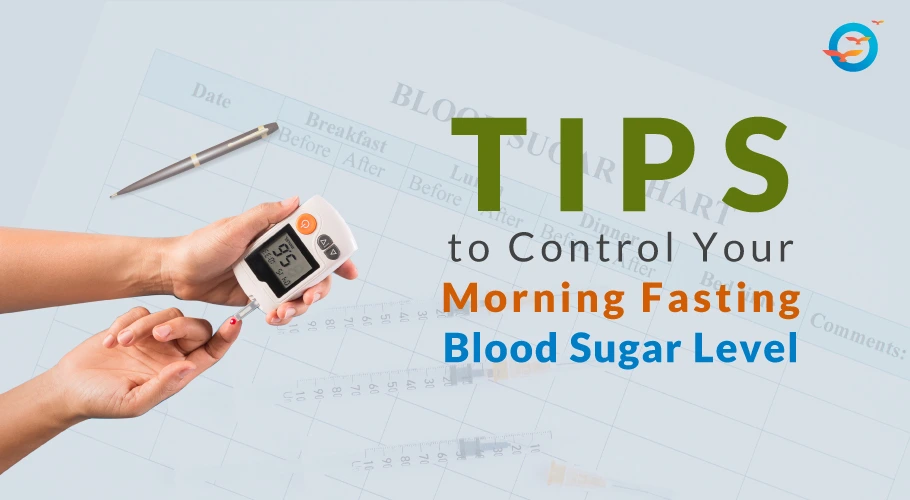Why your Morning fasting sugar level is high?

Why does blood sugar spike in the morning?
As every diabetic knows, diet and exercise are critical in controlling unruly blood sugar levels (BSL), And as many have experienced, a proper regimen usually leads to drops in BSL.
But, often, while postprandial readings often come down to less than 140, morning blood sugar remains stubbornly high. Doctors call this the ‘dawn phenomenon, probably because it usually occurs at dawn—between 2 am and 7 am.
It is important to note that the dawn phenomenon is not restricted to diabetics. It happens to all of us. The only difference is that in non-diabetics it doesn’t cross 100 points.
Frustration often leads diabetics suffering from it to try many things…they reduce their evening/night meals to the point of starvation, eat early—by 7.00 pm, get in a meditation session, cut carbs completely from their supper… but, their morning blood glucose levels remain high.
This, despite normal readings of less than 140 points post meals and no dependence on tablets! If this sounds like you, read on to find out what causes this phenomenon and what you can do to address it.
Where does the extra glucose come from?
The body carries about 120 teaspoons of glucose (~600 grams) in the liver and pancreas and just one teaspoon’s worth in the bloodstream. So the addition of even half a teaspoon into the bloodstream can raise BSL by 50 points. Around about dawn, In anticipation of the activity to come and the energy that will be required, glucose is released into the bloodstream. This release is triggered by four hormones whose effect run counter to insulin.
The hormone factor
While you sleep, your blood sugar slowly drops until it reaches its lowest point, by around 4 - 5 am. About this same time,four hormones in your body start to function. The chief of these is Cortisol, often described as the ‘stress hormone’.
It is accompanied by Growth Hormone, which is responsible for repair and regeneration in the body; Adrenaline, aka the ‘fight-or-flight hormone; and Glucagon, whose primary job is to trigger a release of glucose from the liver into the bloodstream.
What can you do to arrest morning sugar levels?
Although the dawn phenomenon is a completely natural occurrence, the anxiety it can cause is understandable.
There are a few things that you could do to get the dawn phenomenon under control, naturally.
- Add an evening exercise session to your routine—HIIT routines have proven especially effective
- Have your dinner before 7:30 pm
- Reduce or eliminate grains from the night meal…and as much as possible from your other meals too
- Make sure at least half your meal comprises cooked or raw vegetables
- After dinner, say an hour later, do some antigravity exercises, stair climbing for instance.
- Sleep by 9.30 pm…and try to get around 7-8 hours of restful sleep every night
- Have a couple of glasses of FFD’s super-smoothie in the evening (you can find the recipe here)
- Stay away from all screens for at least one hour before going to bed.
- Drink two teaspoons of apple cider vinegar mixed in about 100 ml of water before bedtime
With any luck, these measures will see your morning sugar readings drop down to normal. We say luck because, in spite of their best efforts, the dawn phenomenon continues to plague many diabetics. These measures are not a guarantee, and results do not come overnight. But if you stick with it, you will see an improvement in a couple of months.
Learn more about Body Mass Index (BMI) – visit our blog.
For more information on how to tackle diabetes and how to get free from it, subscribe to our YouTube channel and Facebook & Instagram pages.
FAQs
Why is my morning blood sugar level high?
It can be high due to the dawn phenomenon, where certain hormones like cortisol, adrenaline, and glucagon release glucose into the bloodstream.
What causes high blood sugar in the morning?
High morning blood sugar can be caused by hormones released overnight, like cortisol, that raise blood sugar in preparation for the day.
How can I lower my morning blood sugar levels?
To lower morning blood sugar, you can do the exercise in the evening, avoid grains in night meals, and maintain a healthy bedtime routine.
Can the dawn phenomenon affect my blood sugar even if I control my diet and exercise?
Yes, the dawn phenomenon can still affect blood sugar even with diet and exercise, as it's a natural body process triggered by hormones.
What steps can I take to control high morning blood sugar levels?
You can control your high morning blood sugar by eating dinner early, avoiding heavy carbs at night, getting enough sleep, and doing regular evening exercises.
How does cortisol affect my morning blood sugar levels?
Cortisol, the stress hormone, can raise my blood sugar by promoting the release of glucose from the liver during the early morning hours.

